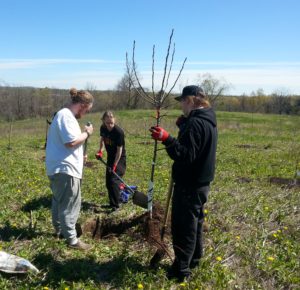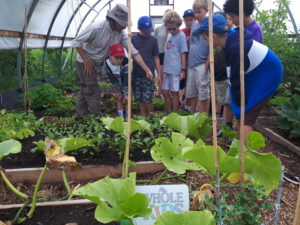
If you are interested in gardening at rare, please complete the Springbank Community Gardens 2024 Participation Questionnaire.
The Springbank Community Gardens at rare Charitable Research Reserve are a special space for those interested in growing their own fresh organic produce. Located within an ecological reserve, the gardens are a unique place where activities are done respectfully and with minimal impact on the environment and the creatures that reside there. We are a multicultural, multi-generational garden site, where the members share knowledge and build relationships in the name of education, responsible land stewardship and inclusion. We support diverse, inclusive, and equitable participation as we work toward meaningful reconciliation with Indigenous Peoples (self-identified and status First Nations, Metis, and Inuit) of Turtle Island.
The benefits of community gardening are many and varied, including everything from better health to strong community building. Growing your own food gives you access to a variety of fresh produce that supports nutritional health and exercise that helps promote healthy living. The food isn’t the only thing that grows at the gardens – gardeners get to know one another and often friendships flourish. There are also benefits to the environment as rainwater is filtered through gardens, and growing food locally means long transportation routes aren’t necessary.
Please note the use of pesticides and synthetic fertilizers are prohibited as rare is committed to organic agriculture methods. The Springbank Community Gardens are open April 15 to November 15, dawn until dusk and are comprised of 110 rentable plots. Compost, water, mulch, hand tools and garden hoses are supplied while you provide the time and the energy to grow your own produce.
The cost to rent a garden plot at Springbank Community Gardens ranges from $30 to $60 per plot, per season.
Springbank Food Bank Gardens
Springbank Farm is home to the Springbank Food Bank Gardens and Orchard. With over 15,000 square feet of space for growing organic vegetables for local food banks, we’ve delivered thousands of kilograms of quality food to those most in need within our immediate community.
Volunteer Opportunities
The Springbank Food Bank Gardens thrive with the help of community volunteers. If you are looking for a rewarding volunteer opportunity for your company, school, church, club, non-profit organization or for yourself we encourage you to contact our Gardens Coordinator (taryn.jarvis@raresites.org) to arrange a volunteer work event.
Springbank Education and Demonstration Gardens

The Springbank Education and Demonstration Gardens area is a place for our Education and Garden teams to lead campers of the Every Child Outdoors (ECO) program in hands-on gardening activities. Campers have the opportunity to get their hands dirty while learning where food comes from, how good fresh foods taste and the importance of quality, homegrown nutrition.
For more information about the Springbank Farm, contact our Garden Coordinator, Taryn Jarvis at 519-650-9336 x115, or taryn.jarvis@raresites.org
Previous Projects
Minjimendan
We are grateful that the Minjimendan project has had a home at rare for the benefit of the community for two years (2018-2020). Out of respect for the wishes of those involved, we are unable to extend our thanks to any particular person but we look forward to seeing the Minjimendan project flourish in a new location in Waterloo Region for the community to enjoy. Minjimendan was located at rare’s Springbank Farm sustainability hub, a multipurpose site and community garden that is also the location of rare’s staff-led food bank garden, established in 2012 and providing thousands of pounds of food to all community members who need it. The lands, owned by rare to be protected intact and in perpetuity, will continue to be stewarded with the help of rare’s various community partners, including knowledge keepers and staff from the Indigenous community, and will continue to be used to provide food to Indigenous community members and others in need. The rare-led food bank garden continues to be supported by a rare-owned greenhouse for seed starting that, due to the pandemic restrictions, is being operated by a single rare staff member who is determined to see the food production run at full capacity.
